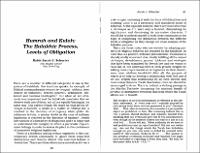Please use this identifier to cite or link to this item:
https://hdl.handle.net/20.500.12202/9215| Title: | Humrah and kulah: The halakhic process, levels of obligation |
| Authors: | Schacter, Jacob J. Schacter, Jacob J. |
| Keywords: | mitzvot commandments adherence observance stringencies leniences rabbinic decrees |
| Issue Date: | 1990 |
| Publisher: | Orthodox Union |
| Citation: | Schacter, J. J. (1990). Humrah and kulah: The halakhic process, levels of obligation. In J. J. Schacter (Ed.), The neglected mizvot (pp. 40-47). OU. |
| Series/Report no.: | Bernard Revel Faculty Publications; |
| Abstract: | There are a number of different categories of law in the system of halakhah. Our tradition speaks. for example, of Biblical commandments (mizvot de-'orayta), rabbinic laws (mizvot de-rabbanan). decrees (gezerot), ordinances (takkanot) and customs (minhagim). 1 But while all are obviously very important and the halakhah mandates that we observe each one of them, not all are equally binding in the same way. Our rabbis (Bezah 3b) teach us that sfeika de- orayta le-humrah, a doubt in a matter of Biblical law is resolved in the direction of stringency while sfeilka de-rabbanan le-kula, a similar doubt in the case of rabbinic legislation is resolved in the direction of leniency. Jewish law consists of a hierarchy of obligations and it is important to understand the category to which a particular requirement belongs in order to assess its place in the continuum of normative religious legislation. |
| Description: | Book chapter |
| URI: | https://www.academia.edu/38034465/Jacob_J_Schacter_Humrah_and_Kulah_The_Halakhic_Process_Levels_of_Obligation_in_Jacob_J_Schacter_ed_The_Neglected_Mizvot_New_York_Orthodox_Union_1990_40_47?sm=b https://hdl.handle.net/20.500.12202/9215 |
| Appears in Collections: | Bernard Revel Graduate School of Jewish Studies (BRGS): Faculty Publications |
Files in This Item:
| File | Description | Size | Format | |
|---|---|---|---|---|
| Jacob_J_Schacter_Humrah_and_Kulah_The_Halakhic process 40-47.pdf | 481.5 kB | Adobe PDF |  View/Open |
This item is licensed under a Creative Commons License

